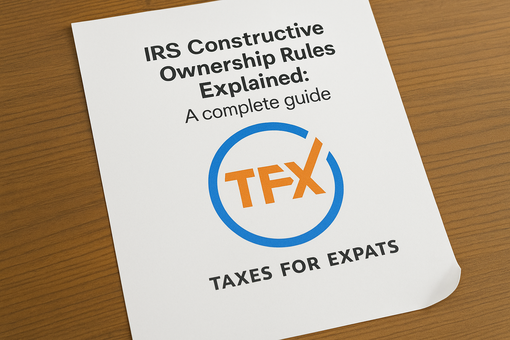Foreign pensions and US taxation: What you need to know

Are you dreaming of retiring on a sun-soaked beach in Bali or spending your late years as a self-professed sommelier in a quaint Italian village? Perhaps you're an American who worked abroad or you have lived as a permanent resident with overseas retirement accounts. Or it could just be that you’re in the process of planning for retirement.
Whatever your situation, understanding how foreign pensions are taxed in the US is crucial for your financial planning. Let's dive into the complexities of foreign pension taxation and equip you with the knowledge you need to navigate this tricky terrain.
This article is brought to you by Taxes for Expats (TFX) – a top-rated tax firm serving US citizens, residents, and anyone with US tax obligations, both at home and abroad. Need help reporting your foreign pension on your US tax return? Schedule your free discovery call, and we’ll review your case and walk you through the next steps.
Are foreign pensions taxed in the US?
The short answer is yes, foreign pensions are generally taxable in the US. The Internal Revenue Service (IRS) considers foreign pension income as taxable, treating it similarly to other forms of income. However, the devil is in the details, and several factors can affect how much of your foreign pension is actually subject to US taxation.
What qualifies as a foreign pension plan?
Before we delve deeper, it's important to understand what the IRS considers a foreign pension plan. Generally, a foreign pension plan is any plan established outside the United States that's designed to provide retirement benefits. This can include:
- government-sponsored social security systems
- employer-sponsored retirement plans
- personal retirement savings accounts
The specific treatment of these plans can vary depending on their structure and the country where they're based.
Types of foreign pensions
Foreign pensions come in various forms, each with its own tax implications:
- Defined benefit plans: These promise a specific payout at retirement, often based on salary and years of service.
- Defined contribution plans: Similar to 401(k) plans in the US, these are based on contributions made by you and possibly your employer.
- Social Security benefits: Many countries have government-sponsored pension systems comparable to US Social Security.
- Personal pension plans: These are individual retirement accounts set up in foreign countries.
How to report income from a foreign pension
Reporting foreign pension income on your US tax return is a crucial step in maintaining compliance with IRS regulations.
Here's what you need to know:
- Form 1040: Report your foreign pension income on your Form 1040, US Individual Income Tax Return. The specific line where you report this income depends on the nature of the pension.
- Form 1116: If you've paid foreign taxes on your pension income, you may be eligible for a foreign tax credit. Use Form 1116 to claim this credit and avoid double taxation.
- Schedule B: If you received distributions from a foreign pension plan, you might need to report this on Schedule B of your Form 1040.
- Form 8833: In some cases, you may need to file Form 8833 to claim treaty benefits related to your foreign pension income.
Pro tip: Keep detailed records of all foreign pension contributions, distributions, and any taxes paid to foreign governments. We strongly suggest digitizing these where possible and storing them in an online drive, as well as somewhere externally. This documentation will be invaluable when preparing your US tax return and that tedious dragon will be no match for your excellent choice of battle cutlery.

Treaty benefits for pension contributions
The United States has tax treaties with numerous countries, and these agreements can significantly impact how your foreign pension is taxed. You might often wonder what kind of masochistic sweater-wearing fuddy duddy comes up with these things, but tax treaties are designed to prevent double taxation and may provide special provisions for pension income.
Some common treaty provisions related to foreign pensions include:
- Exemption of certain pension income: Some treaties allow partial or full pension income exemption from US taxation.
- Reduced tax rates: Treaties may specify lower tax rates for pension income.
- Recognition of pension contributions: Some treaties allow US taxpayers to deduct or exclude contributions to foreign pension plans on their US tax returns.
For example, the US-UK tax treaty allows for mutual recognition of certain pension schemes, potentially providing significant tax benefits for individuals with UK pensions. That’s right, a “special relationship” isn’t just a Gen Z way of describing their dating life - that old US-UK phrase still carries some weight.
Treaty benefits can be complex and vary significantly between countries. It's crucial to consult with a tax professional (don’t forget to compliment his excellent knitted sweater) who specializes in international taxation to fully understand how treaty benefits apply to your specific situation.
FBAR and FATCA requirements
In addition to reporting foreign pension income on your tax return, you may have additional reporting obligations under the Foreign Bank Account Report (FBAR) and Foreign Account Tax Compliance Act (FATCA) regulations. Stop it, we can feel your eyes rolling from here. Let’s break down the difference between these exhilarating acronyms and give a bit more clarity:
FBAR reporting
If the total value of your foreign financial accounts, including pension accounts, exceeds $10,000 at any time during the calendar year, you must file an FBAR. This is done electronically using FinCEN Form 114.
FATCA reporting
Under FATCA, you may need to report your foreign pension on Form 8938, Statement of Specified Foreign Financial Assets, if the total value of your foreign financial assets exceeds certain thresholds. These thresholds vary based on your filing status and whether you live in the US or abroad.
Pro tip: FBAR and FATCA reporting requirements are separate from your tax return filing obligations. It’s super important to make sure you are compliant with these obligations as failing to comply with these reporting requirements can result in severe penalties, even if you don't owe any additional tax. You know the old joke right?

What is the tax deferral treatment?
In some cases, foreign pensions may qualify for tax-deferred treatment similar to US-based retirement accounts. This means you may not have to pay taxes on the contributions or earnings until you start receiving distributions.
However, qualifying for tax deferral can be challenging. The IRS generally doesn't automatically extend tax-deferred status to foreign pension plans. To qualify, the foreign plan must be "substantially similar" to a US-qualified plan, which is a high bar to meet.
There are some situations where a foreign pension may qualify for tax deferral, for example if it's for the exclusive benefit of employees or their beneficiaries. This is a complex topic with many nuances and would deserve its own article.
Even if a plan doesn't qualify for full tax deferral, you may be able to defer taxation on employer contributions until distribution under certain circumstances.
Common pitfalls and compliance risks
Sailing the stormy seas of US tax implications on foreign pensions can be more treacherous than riding shotgun with Captain Ahab, but this story needs an Ishmael - someone needs to survive to write the book. Here are some of the murky dark waters to avoid:
- Assuming foreign pensions are not taxable: Many expats mistakenly believe that foreign pensions are not subject to US taxation. Don’t let that be you, as this can lead to significant tax liabilities and penalties.
- Failing to report foreign pension accounts: Overlooking FBAR and FATCA reporting requirements can result in severe penalties.
- Misunderstanding treaty benefits: Tax treaties can be complex, and misinterpreting their provisions can lead to incorrect reporting.
- Incorrect classification of pension distributions: Mischaracterizing pension distributions as non-taxable can trigger IRS scrutiny. Nobody wants that. The IRS makes TMZ look like an indifferent neighbor keeping themselves to themselves.
- Overlooking state tax obligations: Some states may tax foreign pension income even if it's exempt from federal taxation.
Penalties for non-compliance
The penalties for non-compliance with foreign pension reporting requirements can be severe:
- Failure to file FBAR: Penalties can range from $10,000 for non-willful violations, to north of $100,000 or 50% of the account balance for willful violations.
- FATCA non-compliance: Penalties start at $10,000 and can increase by $10,000 every 30 days, up to a maximum of $50,000.
- Tax underpayment: If you underreport your foreign pension income, you may owe back taxes plus interest and penalties.
In extreme cases, criminal charges could be brought for willful non-compliance.
Conclusion
Navigating the complexities of foreign pension taxation in the US can be rough going, but it's crucial for maintaining compliance and optimizing your retirement strategy. From understanding the basic tax treatment of foreign pensions to leveraging treaty benefits and avoiding common pitfalls, there's a lot to consider.
Remember, the key to successfully managing your foreign pension tax obligations is staying informed and seeking professional guidance when needed. By taking a proactive approach to your foreign pension taxation, you can enjoy your global retirement dreams without running afoul of US tax laws.
Don't let the complexities of foreign pension taxation derail your retirement plans. Take control of your financial future by staying informed and seeking expert advice when needed. With the right approach, you can navigate the maze of international taxation and make the most of your global retirement strategy.

FAQ
Generally, you cannot directly roll over a foreign pension into a US Individual Retirement Account (IRA). However, you may be able to transfer the funds from your foreign pension to your US bank account and then contribute to an IRA, subject to annual contribution limits and eligibility requirements.
Foreign pensions typically do not directly affect your US Social Security benefits. However, if you're subject to the Windfall Elimination Provision (WEP), your Social Security benefits could be reduced if you receive a pension based on work not covered by Social Security.
Pension income, including foreign pension income, is generally not classified as earned income for US tax purposes. It's usually considered unearned income, similar to interest or dividends. This distinction can be important for various tax calculations and eligibility for certain tax benefits.


